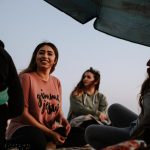Tales From the Border: Sacred Space
What is a sacred space? What does it look like? And where can you find these glimpses of heaven on earth? I am wholeheartedly convinced that the border between the United States and Mexico is a sacred space.
Yes, the presence of God is here. It is a space where the Holy Spirit invites us to shift posture and perspective. Here, we are invited to open our eyes with compassion towards all humanity, without bias or discrimination, and hopefully become more aware that our stories are not exclusive nor separate. The U.S.-Mexico border invites us to slow down and lament; to deeply listen and learn with an open mind, heart, hands, and feet.
Friendship Park, or El Parque de la Amistad, is a binational park — within the U.S. it is located inside California’s Border Field State Park and in Mexico it is at Playas de Tijuana, Baja California. This historically shared space was dedicated in 1971 by First Lady Pat Nixon as a symbol of binational friendship between the U.S. and Mexico. Since then, it has become a place where families come to remember, honor and celebrate loved ones through La Posada Sin Fronteras. It is also here that both strangers and families share ‘pinky kisses’ instead of a warm embrace. On the weekends, Friendship Park is uniting people from this border region to share in this space as One Body. Christians across all denominations in the San Diego-Tijuana region regularly come to this sacred place to become aware of God’s presence and be reminded that we need God’s grace and we need each other.

Last November, Daniel, a 22-year-old college student at Point Loma Nazarene University, was confronted with stories about the families quickly approaching the border between the United States and Mexico. He learned that newly arrived migrants were being dropped off in his city. When Daniel heard this, his heart deeply ached. There were so many questions about God’s grace, justice, compassion, protection, and love. Daniel’s friends, neighbors, and families from within his community were migrants; it was a part of his story. The thought of arriving in a foreign land exhausted, without language fluency, financial resources, or connections left him feeling completely distraught.
The US-Mexico border invites us to slow down and lament; to deeply listen and learn with an open mind, heart, hands, and feet.
Daniel wrestled with his doubts, unable to know, see, and believe if God and the Church were present in the midst of what seemed like unbearable chaos. So, he reached out to me, his Campus Pastor at Point Loma Nazarene University, and asked for guidance to best engage the stirring that was happening within him.
Together we prayed, then connected with local pastors and ministry partners in the San Diego-Tijuana border region to assess the best ways to come alongside established efforts. Daniel learned that the need was urgent on both sides of the border; people were hungry, tired and weary. In the days, weeks and months to follow, God’s spirit brought together Daniel, the PLNU community, San Diego First Church of the Nazarene, and the Northern Mexico Church of the Nazarene to continue to do good work within the San Diego-Tijuana border region.
Daniel’s encounter is one of the many stories we find within the San Diego-Tijuana border region.
Christians across all denominations in the San Diego-Tijuana region regularly come to this sacred place to become aware of God’s presence and be reminded that we need God’s grace and we need each other.
So, what happens when God stirs in our life? How do we understand and interpret lament? Could it be that God’s Spirit causes ripples within us as an invitation to slow down? Could it be that when we deeply listen and learn with an open mind, heart, hands, and feet we are guided by God’s Spirit into sacred spaces?
This story was originally published on the Nazarene Compassionate Ministries’ website and can be read in entirety here. It can also be found on the PLNU Viewpoint website here.
Liliana Reza is the National Advocacy Specialist at World Relief. Prior to her joining the team, she worked at Point Loma Nazarene University in San Diego, directing cross-border engagement programs and as a campus pastor. She is an ordained elder with the Church of the Nazarene and holds a Masters in Intercultural Studies.






